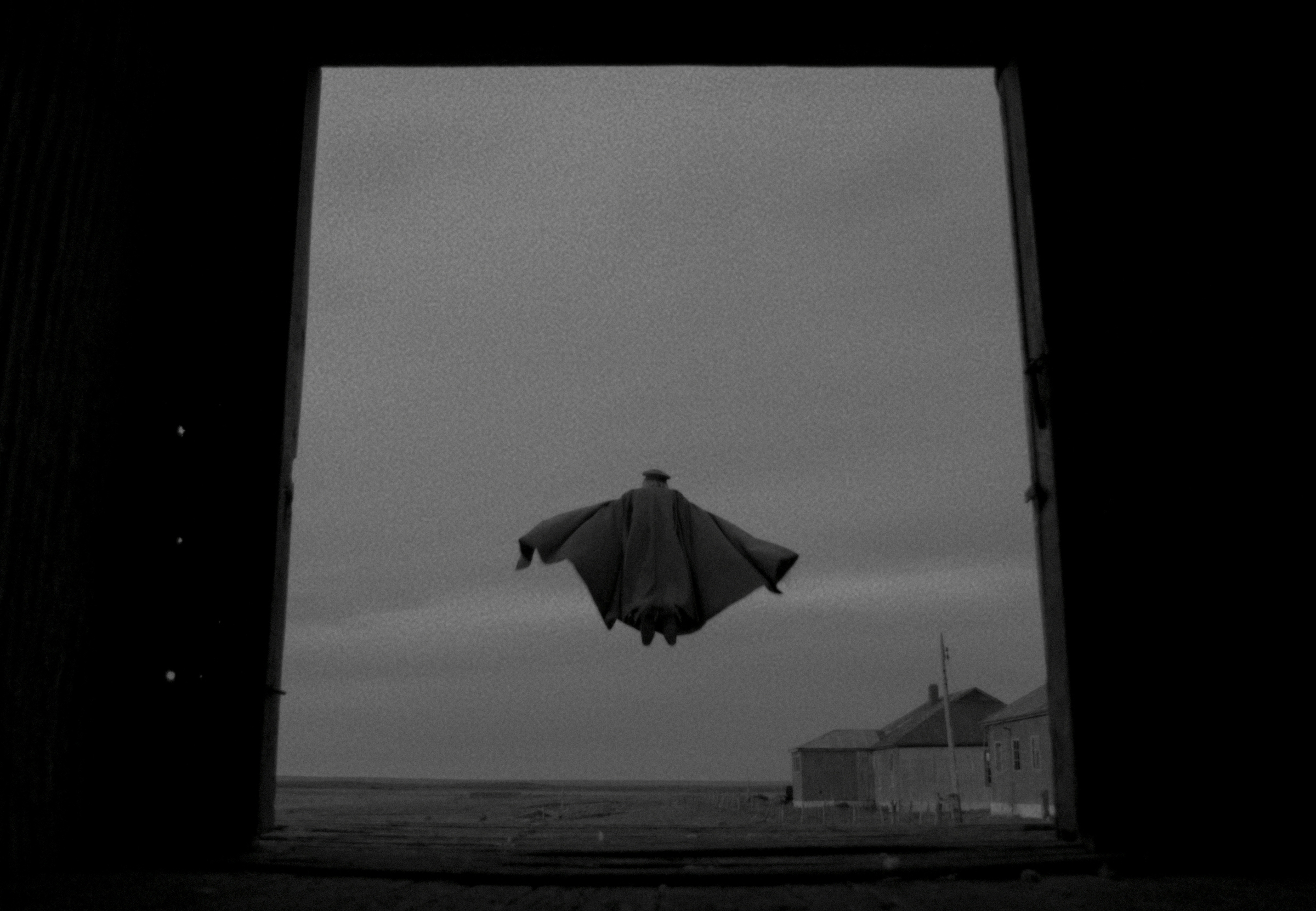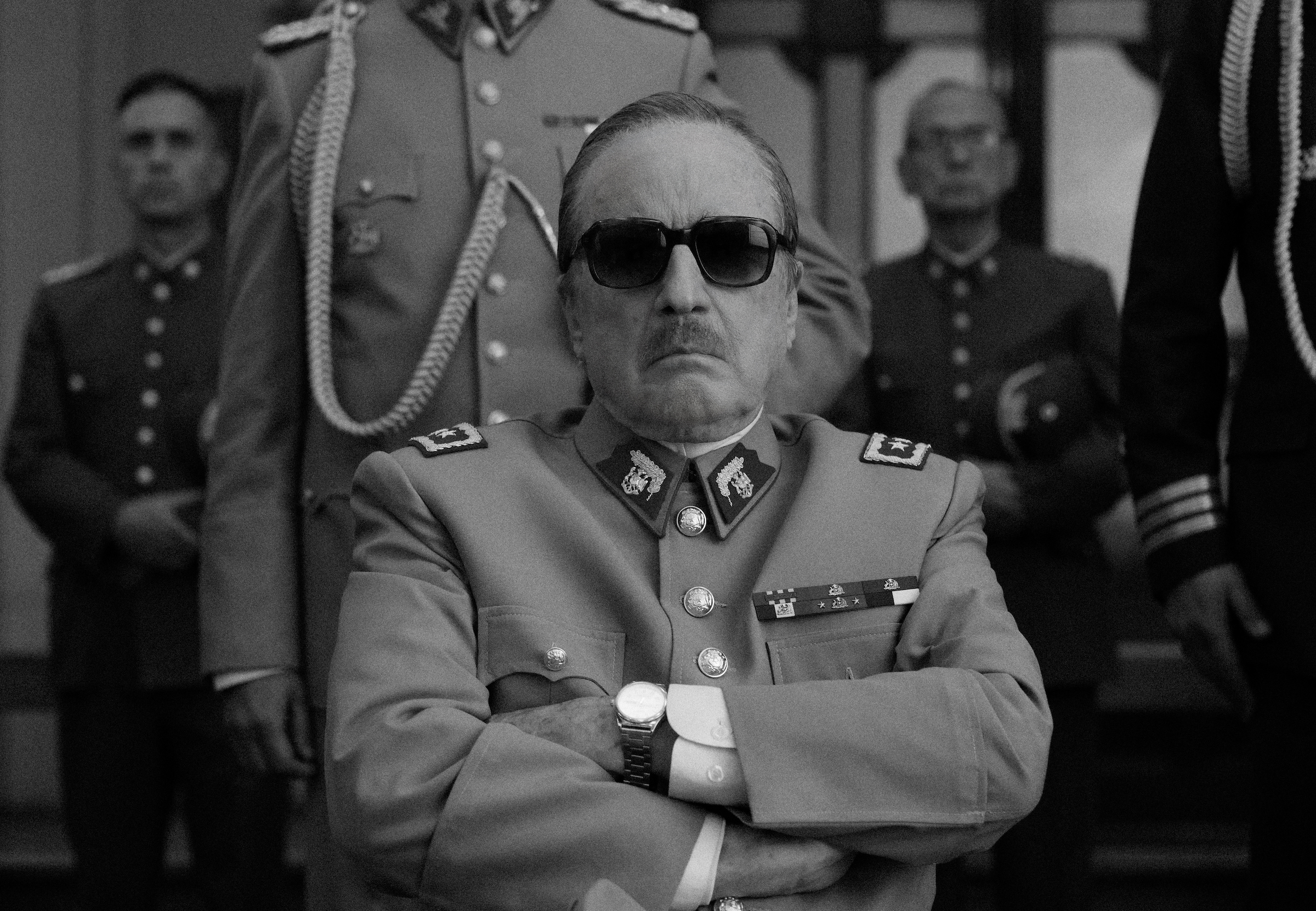Sept. 11 marked the 50th anniversary of the Chilean coup, a bloody U.S.-backed military overthrow that catalyzed the brutal 17-year dictatorship of Augusto Pinochet. Not by accident, El Conde, the satirical horror that renders Pinochet as a 250-year-old vampire, began releasing in theaters on Sept. 7 and comes to Netflix on Sept. 15, bookending the date.
“It was an odd day,” Pablo Larraín, who co-wrote and directed the film, tells TIME following the anniversary. “I might have been naive, but I think many of us thought that a national agreement that something like this should never happen again could be [instilled] in the vast majority. That did not happen.”
El Conde is surreal—Pinochet (Jaime Vadell) is a bloodthirsty vampire who exists in the present day and refuses to die, to the ire of his inheritance-hungry children. His mother, the film reveals in the third act, is Margaret Thatcher, also a vampire—and it’s a gory horror movie. The vampires hunt for hearts, flying over contemporary Santiago, targeting victims, slicing still-beating hearts out of chests, and blending them into mealy smoothies.
“We're not going to make a realistic story, because the realistic version could trigger empathy, and that is very dangerous,” Larraín says. “We're going to do a satire, a farce.”

El Conde and Chilean history
Pinochet’s legacy still pervades Chile. Right-wing opposition leaders in the Chilean government did not participate in official events to commemorate the violent coup and ensuing deaths, and earlier this month, they refused to sign a commitment to democracy. More than a third of Chileans think that the coup was justified and 20% see Pinochet as one of the best rulers of 20th-century Chile.
The central metaphor of the film—that Pinochet, his regime, and its ramifications are immortal, echoing through history—is more than apt. To Larraín, it appears clearly in Chile’s economic trajectory after Pinochet took power. At the time of the coup, Chile was facing an economic crisis and soaring inflation. Pinochet responded by propagating an extreme form of capitalism, bestowing consumerism on the haves and continued poverty on the have-nots. Today, almost 70% of Chileans earn less than $800 in a month, Larraín points out, and the top 1% holds half of the country’s wealth.
“As the narrator in the film says, what Pinochet really achieved was that he turned us into heroes of greed,” Larraín says. “If I were to say where he's more visible and present, it's that he turned us all into greedy [people].”
The disembodied, posh narrator of the film is former U.K. prime minister Margaret Thatcher (Stella Gonet). Per the movie, she became a vampire in the mid-18th century, when she was an English seasonal worker in the vineyards of southern France. A slave-trafficking vampire named Strigoi bit and raped her, and she had Claude Pinoche, who she left in a basket outside of a Parisian orphanage. Thatcher then crossed the English Channel to Great Britain and went on to become the Iron Lady.
In real life, Thatcher—and former president George H.W. Bush—called upon the British government to release Pinochet from house arrest in London in 1999, arguing that he should be allowed to return to Chile rather than be extradited to Spain. While he was on house arrest, Thatcher sent Pinochet a bottle of fine scotch with a note: “Scotch is one British institution that will never let you down.”
“It was important for us to have Thatcher's character, because there's a feeling of a country that was conquered through an economical model and through violence,” Larraín says. “And that is the cocktail that remains, I think, alive in our country.”

Why Larraín returns to Pinochet
The idea of empathy, or an intentional lack thereof, has cropped up repeatedly within Larraín’s work. Three of the Chilean filmmaker’s earlier movies—2008’s Tony Manero, 2010’s Post Mortem, and 2012’s No—comprise an unintentional trilogy that traces Pinochet’s dictatorship from the coup through the plebiscite that voted him out of power. The first, set in 1978, follows a callous man who’s obsessed with John Travolta's character in the 1977 movie Saturday Night Fever. In the second, set during the coup itself, an indifferent pathologist’s assistant takes down commentary during autopsies. More recently, Larraín directed 2016’s Jackie, starring Natalie Portman as Jackie Kennedy, and 2021’s Spencer, starring Kristen Stewart as Princess Diana.
“Tony Manero and Post Mortem were movies that were portraying the lack of empathy,” Larraín says. “The main characters were peripheral consequences of the regime.”
The filmmaker never planned for Pinochet to become an integral figure to so much of his oeuvre. Rather, he was inextricably drawn to him, circling closer and closer with each subsequent movie. By the time he got to El Conde, his work was in figuring out how to portray the dictator onscreen. This is the first time that an actor has played Pinochet in a piece of fiction, Larraín says.
Larraín himself is a bit of a lightning rod, at least in Chile. His father was the president of one of Chile’s main right-wing parties, which supported the dictatorship. His mother served as a cabinet minister in Chile’s conservative government. She is a Matte, one of Chile’s wealthiest families, which has been accused of driving out Mapuche Indigenous people from their lands. Left-wing Chileans have questioned whether Larraín is the right person to tell these stories, arguing that his family was insulated from the effects of the dictatorship.
“I grew up in a protected environment, where I was never exposed to any of the danger of the dictatorship,” Larraín says. “My family's mid-upper class and back then, they were right-wing people; they still are.”
So he needed to create his own social and class consciousness, which developed between high school and college. In a recent interview with The Guardian, Larraín argued that he is Chilean and Chile is his world—how could he not be allowed to talk about what happened there?
Almost 1,500 dissidents “disappeared,” 40,000 people were tortured, and nearly 2,000 were tortured to death, at least according to official reports. Larraín was 12 when the plebiscite to end Pinochet’s rule, the subject of his film No, took place in 1988.
“It's what a 12-year-old kid can remember, but I remember a sense of change and a sense of transition,” Larraín says. “And I remember that Pinochet had this figure of power that made me uneasy and somehow nervous.”
For Larraín and countless others, Pinochet was a shadowy figure, just as menacing and ominous as his swirling cape in El Conde. In real life, the dictator died at age 91 in 2006, investigated and indicted, but never convicted.
“I don't think you need to be in a dark spot to look at evil,” Larraín says. “You just have to be—you want to be as brave as possible.”
More Must-Reads from TIME
- Caitlin Clark Is TIME's 2024 Athlete of the Year
- Where Trump 2.0 Will Differ From 1.0
- Is Intermittent Fasting Good or Bad for You?
- The 100 Must-Read Books of 2024
- Column: If Optimism Feels Ridiculous Now, Try Hope
- The Future of Climate Action Is Trade Policy
- FX’s Say Nothing Is the Must-Watch Political Thriller of 2024
- Merle Bombardieri Is Helping People Make the Baby Decision
Contact us at letters@time.com